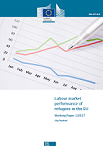ECB, (2017), “Financial Stability Review”, ECB, May The Financial Stability Review (FSR) assesses developments relevant for financial stability, including identifying and prioritising the main sources of systemic risk and vulnerabilities for the euro area financial system – comprising intermediaries, markets and market infrastructures. It does so to promote awareness of these systemic risks among policymakers, the financial industry and the public at large, with the ultimate goal of promoting financial stability. …Read More
Debt Limits and the Structure of Public Debt
Pienkowski, Alex, (2017), “Debt Limits and the Structure of Public Debt”, IMF, 22 Μαΐου This paper provides a tractable framework to assess how the structure of debt instruments—specifically by currency denomination and indexation to GDP—can raise the debt limit of a sovereign. By calibrating the model to different country fundamentals, it is clear that there is no one-size-fits-all approach to optimal instrument design. For instance, low income countries may find benefit …Read More
Financial integration in Europe
ECB, (2017), “Financial integration in Europe”, ECB, Μάιος 2017 The ECB’s annual report on financial integration in Europe contributes to the advancement of the process of European financial integration by analysing its development and the related policies. For the ECB, the market for a given set of financial instruments and/or services is fully integrated if all potential market participants with the same relevant characteristics: (1) face a single set of rules …Read More
Determinants of FDI inflows in advanced economies: Does the quality of economic structures matter?
Dellis, Konstantinos, Sondermann, David, Vansteenkiste, Isabel, (2017), “Determinants of FDI inflows in advanced economies: Does the quality of economic structures matter?”, ECB Working Paper Series No 2066, Mάιος This paper investigates the role of economic structures as determinants of FDI inflows. We expand on the existing literature by focusing on advanced economies, using a newly available measure of FDI which cleans the data from statistical artefacts, such as financial round tripping, …Read More
The importance of being special: repo markets during the crisis
Corradin, Stefano, Maddaloni, Angela, (2017), “The importance of being special: repo markets during the crisis”, ECB, Μάιος 2017 Specialness – the premium of procuring a specific security in the repo market – increased in the second half of 2011 for Italian government bonds. We assess the impact on specialness of the outright purchase program of the Eurosystem during the same period. Bonds bought by the Eurosystem had higher specialness. The impact was …Read More
Labour market performance of refugees in the EU
Peschner, Jörg, (2017), “Labour market performance of refugees in the EU”, Working Paper 1/2017, European Commission, Directorate-General for Employment, Social Affairs and Inclusion, 5 Μαϊου This paper analyses the individual and socio-demographic factors behind the low employment rate of refugees compared to individuals born in the EU but also compared to other migrants. It complements the 2016 Employment and Social Developments Review where a chapter was dedicated to the labour …Read More
The Eurosystem collateral framework explained
Bindseil, Ulrich, Corsi, Marco, Sahel, Benjamin, Visser, Ad, (2017), “The Eurosystem collateral framework explained”, ECB Occasional Paper Series No 189, Μάιος The Eurosystem collateral framework (ESCF) has played a key role in the ECB monetary policy implementation since 1999. Moreover, the financial and sovereign debt crisis and with it the increased reliance of banks on central bank credit have underlined the importance of central bank collateral frameworks. Broad collateral frameworks have …Read More
Economic Bulletin
European Central Bank, (2017), “Economic Bulletin”, Issue 3, Μάιος The ECB’s monetary policy measures have continued to preserve the very favourable financing conditions that are necessary to secure a sustained convergence of inflation rates towards levels below, but close to, 2% over the medium term. Incoming data since the Governing Council’s meeting in early March confirm that the cyclical recovery of the euro area economy is becoming increasingly solid and …Read More
International Financial Integration in the Aftermath of the Global Financial Crisis
Milesi-Ferretti, Gian M, Lane, Philip R., (2017), “International Financial Integration in the Aftermath of the Global Financial Crisis“, IMF, 10 Μαΐου This paper documents the evolution of international financial integration since the global financial crisis using an updated dataset on external assets and liabilities, covering over 210 economies for the period 1970-2015. It finds that the growth in cross-border positions in relation to world GDP has come to a halt. …Read More
The Dynamics of Government Bond Yields in the Eurozone
Akram, Tanweer, Das, Anupam, (2017), “The Dynamics of Government Bond Yields in the Eurozone”, Levy Economics Institute Working Paper No. 889, Μάϊος This paper investigates the determinants of nominal yields of government bonds in the eurozone. The pooled mean group (PMG) technique of cointegration is applied on both monthly and quarterly datasets to examine the major drivers of nominal yields of long-term government bonds in a set of 11 eurozone …Read More






